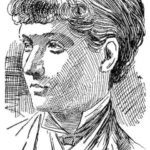 | |
The Harshaw Bride | |
| Author | Mary Hallock Foote |
|---|---|
| Published |
1888
|
| Language | English |
| Nationality | American |
| Genre | Historical Fiction, Western |
1888 Short Story
The Harshaw Bride
The Harshaw Bride is an English Historical Fiction, Western short story by American writer Mary Hallock Foote. It was first published in 1888. "I don't believe in kicking, as a rule; but if you do kick, kick hard, I say. 'If you don't send for her, Micky, I'll send for her myself,' I said."
The Harshaw Bride
by Mary Hallock Foote
[Mrs. Tom Daly, of Bisuka in the Northwest, writes to her invalid sister spending the summer on the coast of Southern California.]
I
You know I am always ready to sacrifice truth to politeness, if the truth is of that poor, stingy upstart variety everybody is familiar with and if the occasion warrants the expense. We all know politeness is not cheap, any more than honesty is politic. But surely I mistook my occasion, one day last winter–and now behold the price!
We are to have a bride on our hands, or a bride-elect, for she isn’t married yet. The happy man to be is rustling for a home out here in the wilds of Idaho while she is waiting in the old country for success to crown his efforts. How much success in her case is demanded one does not know. She is a little English girl, upper middle class, which Mrs. Percifer assures us is the class to belong to in England at the present day,–from which we infer that it’s her class; and the interesting reunion is to take place at our house–the young woman never having seen us in her life before.
She sailed, poor thing, this day week and will be forwarded to us by her confiding friends in New York as soon as she arrives. Meantime she will have heard from us from the Percifers: that is something.
Really they were very nice to us in New York, last winter, the Percifers–though one must not plume one’s self too much. It began as a business flirtation down town between the husbands, and then Tom confidingly mentioned that he had a wife at his hotel. We unfortunate women were dragged into it forthwith, and more or less forced to live up to it. I cannot say there was anything riotous in the way she sustained her part. She was so very impersonal in fact, when we said good-by, that my natural tendency to invite people to come and stay with us, on the spur of any moment, was strangled in my throat.
But one must say something by way of retaliation for hospitality one cannot reject. So I put it off on any friends of theirs who might have occasion to command us in the West. We should be so happy, and so forth. And, my dear, she has taken me up on it! She’s not impersonal now. She is so glad–for dear Kitty’s sake–that we are here, and she is sure we will be very good to her–such a sweet girl, no one could help being–which rather cuts down the margin for our goodness. The poor child–I am quoting Mrs. Percifer–knows absolutely no one in the West but the man she is coming to marry (?)and can have no conception of the journey she has before her. She will be so comforted to find us at the end of it. And if anything unforeseen should occur to delay Mr. Harshaw, the fiance, and prevent his meeting her train, it will be a vast relief to Kitty’s friends to know that the dear brave little girl is in good hands–ours, if you can conceive it!
Please observe the coolness with which she treats his not meeting that train, after the girl has traversed half the globe to compass her share of their meeting.
Well, it’s not the American way; but perhaps it will be when bad times have humbled us a little more, and the question is whether we can marry our daughters at all unless we can give them dowries, or professions to support their husbands on, and “feelings” are a luxury only the rich can afford.
I hope “Kitty” won’t have any; but still more I hope that her young man will arrive on schedule time, and that they can trot round the corner and be married, with Tom and me for witnesses, as speedily as possible.
* * * * *
I’ve had such a blow! Tom, with an effort, has succeeded in remembering this Mr. Harshaw who is poor Kitty’s fate. He must have been years in this country,–long enough to have citizenized himself and become a member of our first Idaho legislature (I don’t believe you even know that we are a State!). Tom was on the supper committee of the ball the city gave them. They were a deplorable set of men; it was easy enough to remember the nice ones. Tom says he is a “chump,” if you know what that means. I tell him that every man, married or single, is constitutionally horrid to any other man who has had the luck to be chosen of a charming girl. But I’m afraid Harshaw wasn’t one of the nice ones, or I should have remembered him myself; we had them to dinner–all who were at all worth while.
Poor Kitty! There is so little here to come for but the man.
Well, my dear, here’s a pretty kettle of fish! Kitty has arrived, and one Mr. Harshaw. Where the Mr. Harshaw is, quien sabe! It’s awfully late. Poor Kitty has gone to bed, and has cried herself to sleep, I dare say, if sleep she can. I never have heard of a girl being treated so.
Tom and the other Mr. Harshaw are smoking in the dining-room, and Tom is talking endlessly–what about I can’t imagine, unless he is giving this young record-breaker his opinion of his extraordinary conduct. But I must begin at the beginning.
Mrs. Percifer wired us from New York the day the bride-elect started, and she was to wire us from Ogden, which she did. I went to the train to meet her, and I told Tom to be on the watch for the bridegroom, who would come in from his ranch on the Snake River, by wagon or on horseback, across country from Ten Mile. To come by rail he’d have had to go round a hundred miles or so, by Mountain Home. An American would have done it, of course, and have come in with her on the train; but the Percifers plainly expected no such wild burst of enthusiasm from him.
The train was late. I walked and walked the platform; some of the people who were waiting went away, but I dared not leave my post. I fell to watching a spurt of dust away off across the river toward the mesa. It rolled up fast, and presently I saw a man on horseback; then I didn’t see him; then he had crossed the bridge and was pounding down the track-side toward the depot. He pulled up and spoke to a trainman, and after that he walked his horse as if he was satisfied.
This is Harshaw, I thought, and a very pretty fellow, but not in the least like an Idaho legislator. I can’t say that I care for the sort of Englishman who is so prompt to swear allegiance to our flag; they never do unless they want to go in for government land, or politics, or something that has nothing to do with any flag. But this youngster looked ridiculously young. I simply knew he was coming for that girl, and that he had no ulterior motives whatever. He was ashy-white with dust–hair, eyebrows, eyelashes, and his fair little mustache all powdered with it; his corduroys, leggings, and hat all of a color. I saw no baggage, and I wondered what he expected to be married in. He leaned on his horse dizzily a moment when he first got out of the saddle, and the poor beast stretched his fore legs, and rocked with the gusts of his panting, his sides going in and out like a pair of bellows. The young fellow handed him over to a man to take to the stables, and I saw him give him a regular bridegroom’s tip. He’s all right, I said to myself, and Tom was horrid to call him a “chump.” He beat himself off a bit, and went in and talked to the ticket-agent. They looked at their watches.
“I don’t think you’ll have time to go uptown,” said the ticket-man.
Harshaw came out then, and he began to walk the platform, and to stare down the track toward Nampa; so I sat down. Presently he stopped, and raised his hat, and asked if I was Mrs. Daly, a friend of Mrs. Percifer of London and New York.
Not to be boastful, I said that I knew Mrs. Percifer.
“Then,” said he, “we are here on the same errand, I think.”
I was there to meet Miss Kitty Comyn, I told him, and he said so was he, and might he have a little talk with me? He seemed excited and serious, very.
“Are you the Mr. Harshaw?” I asked, though I hadn’t an idea, of course, that he could be anybody else.
“Not exactly,” he said. “I’m his cousin, Cecil Harshaw.”
“Is Mr. Harshaw ill?”
He looked foolish, and dropped his eyes. “No,” said he. “He was well last night when I left him at the ranch.” Last night! He had come a hundred miles between dark of one day and noon of the next!
“Your cousin takes a royal way of bringing home his bride–by proxy,” I said.
“Ah, but it’s partly my fault, you know”–he could not quell a sudden shamefaced laugh,–“if you’d kindly allow me to explain. I shall have to be quite brutally frank; but Mrs. Percifer said”–Here he lugged in a propitiatory compliment, which sounded no more like Mrs. Percifer than it fitted me; but mistaking my smile of irony for one of encouragement, he babbled on. I wish I could do justice to his “charmin'” accent and his perfectly unstudied manner of speech, a mixture of British and American colloquialisms, not to say slang.
“It’s like this, Mrs. Daly. A man oughtn’t to be a dog-in-the-manger about a girl, even if he has got her promise, you know. If he can’t get a move on and marry her before her hair is gray, he ought to step out and give the other fellows a chance. I’m not speaking for myself, though I would have spoken three years ago if she hadn’t been engaged to Micky–she’s always been engaged to him, one may say. And I accepted the fact; and when I came over here and took a share in Micky’s ranch I meant right by him, and God knows I meant more than right by her. Wasn’t it right to suppose she must be tremendously fond of him, to let him keep her on the string the way he has? They’ve been engaged four years now. And was it any wonder I was mad with Micky, seeing how he was loafing along, fooling his money away, not looking ahead and denying himself as a man ought who’s got a nice girl waiting for him? I’m quite frank, you see; but when you hear what an ass I’ve made of myself, you’ll not begrudge me the few excuses I have to offer. All I tried to do was to give Micky a leg to help him over his natural difficulty–laziness, you know. He’s not a bad sort at all, only he’s slow, and it’s hard to get him to look things square in the face. It was for her sake, supposing her happiness was bound up in him, that I undertook to boom the marriage a bit. But Micky won’t boom worth a —-. He’s back on my hands now, and what in Heaven’s name I’m to say to her”–His eloquence failed him here, and he came down to the level of ordinary conversation, with the remark, “It’s a facer, by Jove!”
I managed not to smile. If he’d undertaken, I said, to “boom” his cousin’s marriage to a girl he liked himself, he ought at least to get credit for disinterestedness; but so few good acts were ever rewarded in this world! I seemed to have heard that it was not very comfortable, though it might be heroic, to put one’s hand between the tree and the bark.
“Ah,” he said feelingly, “it’s fierce! I never was so rattled in my life. But before you give me too much credit for disinterestedness, you know, I must tell you that I’m thinking of–that–in short, I’ve a mind to speak for myself now, if Micky doesn’t come up to time.”
I simply looked at him, and he blushed, but went on more explicitly. “He could have married her, Mrs. Daly, any time these three years if he’d had the pluck to think so. He’d say, ‘If we have a good season with the horses, I’ll send for her in the fall.’ We’d have our usual season, and then he’d say, ‘It won’t do, Cecy.’ And in the spring we are always as poor as jack-rabbits, and so he’d wait till the next fall. I got so mad with his infernal coolness, and the contrast of how things were and how she must think they were! Still, I knew he’d be good to her if he had her here, and he’d save twice as much with her to provide for as he ever could alone. I used to hear all her little news, poor girl. She had lost her father, and there were tight times at home. The next word was that she was going for a governess. Then I said, ‘You ought to go over and get her, or else send for her sharp. You are as ready to marry her now as ever you will be.’
“‘I’m too confounded strapped,’ said he. I told him I would fix all that if he would go, or write her to come. But the weeks went by, and he never made a move. And there were reasons, Mrs. Daly, why it was best that any one who cared for him should be on the ground. Then I made my kick. I don’t believe in kicking, as a rule; but if you do kick, kick hard, I say. ‘If you don’t send for her, Micky, I’ll send for her myself,’ I said.
“‘What for?’ said he.
“‘For you,’ said I, ‘if you’ll have the manliness to step up and claim her, and treat her as you ought. If not, she can see how things are, and maybe she’ll want a change. You may not think you are wronging her and deceiving her,’ I said, ‘but that’s what you are; and if you won’t make an end of this situation’ (I haven’t told you, and I can’t tell you, the whole of it, Mrs. Daly), ‘I will end it myself–for your sake and for her sake and for my own.’ And I warned him that I should have a word to say to her if he didn’t occupy the field of vision quite promptly after she arrived. ‘One of us will meet her at the train,’ said I, ‘and the one who loves her will get there first.’
“Well, I’m here, and he was cooking himself a big supper when I left him at the ranch. It was a simple test, Mrs. Daly. If he scorned to abide by it, he might at least have written and put her on her guard, for he knew I was not bluffing. He pawed up the ground a bit, but he never did a thing. Then I cabled her just the question, Would she come? and she answered directly that she would. So I wired her the money. I signed myself Harshaw, and I told Micky what I’d done.
“And whether he is sulking over my interference, I can’t say, but from that moment he has never opened his mouth to me on the subject. I haven’t a blessed notion what he means to do; judging by what he has done, nothing, I should say. But it may be he’s only waiting to give me the full strength of the situation, seeing it’s one of my own contriving. There’s a sort of rum justice in it; but think of his daring to insult her so, for the sake of punishing me!
“Now, what am I to say to her, Mrs. Daly? Am I to make a clean breast of it, and let her know the true and peculiar state of the case, including the fact that I’m in love with her myself? Or would you let that wait, and try to smooth things over for Micky, and get her to give him another chance? There was no sign of his moving last night; still, he may get here yet.”
The young man’s spirits seemed to be rising as he neared the end of his tale, perhaps because he could see that it looked pretty black for “Micky.”
“If one could only know what he does mean to do, it would be simpler, wouldn’t it?”
I agreed that it would. Then I made the only suggestion it occurred to me to offer in the case–that he should go to his hotel and get his luncheon or breakfast, for I doubted if he’d had any, and leave me to meet Miss Comyn, and say to her whatever a kind Providence might inspire me with. My husband would call for him and fetch him up to dinner, I said; and after dinner, if Mr. Michael Harshaw had not arrived, or sent some satisfactory message, he could cast himself into the breach.
“And I’m sorry for you,” I said; “for I don’t think you will have an easy time of it.”
“She can’t do worse than hate me, Mrs. Daly; and that’s better than sending me friendly little messages in her letters to Micky.”
I wish I could give you this story in his own words, or any idea of his extraordinary, joyous naturalness, and his air of preposterous good faith–as if he had done the only thing conceivable in the case. It was as convincing as a scene in comic opera.
“By the way,” said he, “I didn’t encumber myself with much luggage this trip. I have nothing but the clothes I stand in.”
I made a reckless offer of my husband’s evening things, which he as recklessly accepted, not knowing if he could get into them; but I thought he did not look so badly as he was, in his sun-faded corduroys, the whole of him from head to foot as pale as a plaster cast with dust, except his bright blue eyes, which had hard, dark circles around them.
“The train is coming,” I warned him.
“She is coming! A la bonne heure!” he cried, and was off on a run, and whistled a car that was going up Main Street to the natatorium; and I knew that in ten minutes he would be reveling in the plunge, while I should be making the best of this beautiful crisis of his inventing to Miss Comyn.
* * * * *
My dear, they are the prettiest pair! Providence, no doubt, designed them for each other, if he had not made this unpardonable break. She has a spirit of her own, has Miss Kitty, and if she cried up-stairs alone with me,–tears of anger and mortification, it struck me, rather than of heart-grief,–I will venture she shed no tears before him.
As Mr. Michael Harshaw did not arrive, we gave Mr. Cecil his opportunity, as promised, of speech with his victim and judge. He talked to her in the little sitting-room after dinner–as long as she would listen to him, apparently. We heard her come flying out with a sort of passionate suddenness, as if she had literally run away from his words. But he had followed her, and for an instant I saw them together in the hall. His poor young face was literally burning; perhaps it was only sunburn, but I fancied she had been giving him a metaphorical drubbing–“ragging,” as Tom would call it–worse than Lady Anne gave Richard.
She was still in a fine Shakespearean temper when I carried her off up-stairs. Reserves were impossible between us; her right to any privacy in her own affairs had been given away from the start; that was one of the pleasing features of the situation.
“Marry him! marry him!” she cried. “That impertinent, meddlesome boy! That false, dishonorable”–
“Go slow, dear,” I said. “I don’t think he’s quite so bad as that.”
“And what do I want with him! And what do you think he tells me, Mrs. Daly? And whether there’s any truth in him, how do I know? He declares it was not Michael Harshaw who sent for me at all! The message, all the messages, were from him. In that case I have been decoyed over here to marry a man who not only never asked me to come, but who stood by and let me be hoaxed in this shameful way, and now leaves me to be persecuted by this one’s ridiculous offers of marriage,–as if I belonged to all or any of the Harshaws, whichever one came first! Michael may not even know that I am here,” she added in a lower key. “If Cecil Harshaw was capable of doing what he has done, by his own confession, it would be little more to intercept my answers to his forgeries.”
That was true, I said. It was quite possible the young man lied. She would, of course, give Mr. Michael Harshaw a chance to tell his story.
“I cannot believe,” said the distracted girl, “that Michael would lend himself, even passively, to such an abominable trick. Could any one believe it–of his worst enemy!”
Impossible, I agreed. She must believe nothing till she had heard from her lover.
“But if Michael did not know it,” she mused, with a piteous blush, “then Cecil Harshaw must have sent me that money himself–the insolence! And after that to ask me to marry him!”
Men were fearfully primitive still, after all that we had done for them, I reminded her, especially in their notions of love-making. Their intentions were generally better than their methods. No great harm had been done, for that matter. A letter, if written that night, would reach Mr. Michael Harshaw at his ranch not later than the next night. All these troubles could wait till the real Mr. Harshaw had been heard from. My husband would see that her letter reached him promptly, and in the mean time Mr. Cecil need not be told that we were proving his little story.
I was forced to humor her own theory of her case; but I have no idea, myself, that Cecil Harshaw has not told the truth. He does not look like a liar, to begin with, and how silly to palm off an invention for to-day which to-morrow would expose!
Tom is still talking and talking. I really must interfere and give Mr. Cecil a chance to go. It is quite too late to look for the other one. If he comes at this hour, there is nothing he can do but go to bed.
… Well, the young man has gone, and Tom is shutting up the house, and I hope the bride is asleep, though I doubt it. Have I told you how charming she is? Not so discouragingly tall or so classic as the Du Maurier goddess, but “comfy,” much more “comfy,” to my mind. Her nose is rudimentary, rather, which doesn’t prevent her having a mind of her own, though noses are said to have it all to say as to force of character. Her upper lip has the most fascinating little pout; her chin is full and emotional–but these are emotional times; and there is a beautiful finish about her throat and hands and wrists. She looks more dressed in a shirt-waist, in which she came down to dinner, her trunk not having come, than some of us do in the best we have. Her clothes are very fresh and recent, to a woman of Idaho; but she does not wear her pretty ears “cachees,” I am glad to say. They are very pretty, and one–the left one–is burned pure crimson from sitting next the window of her section all the way from Omaha.
But why do I write all this nonsense at twelve o’clock at night, when all I need say by way of description is that we want her to stay with us, indefinitely if necessary, and let her countrymen and lovers go to–their ranch on the Snake River!
* * * * *
What do you suppose those wretches were arguing about in the dining-room last night, over their whisky and soda? Sentiment was “not in it,” as they would say. They were talking up a scheme–a scheme that Tom has had in mind ever since he first saw the Thousand Springs six years ago, when he had the Snake River placer-mining fever. It was of no use then, because electrical transmission was in its infancy, its long-distance capacities undreamed of. But Harshaw was down there fishing last summer, and he was able to satisfy the only doubt Tom has had as to some natural feature of the scheme–I don’t know what; but Harshaw has settled it, and is as wild as Tom himself about the thing. Also he wants to put into it all the money he can recover out of his cousin’s ranch. (I shouldn’t think the future of that partnership would be exactly happy!) And now they propose to take hold of it together, and at once.
Harshaw, who, it seems, is enough of an engineer to run a level, will go down with Tom and make the preliminary surveys. Tom will work up the plans and estimates, and prepare a report, which Harshaw will take to London, where his father has influence in the City, and the sanguine child sees himself placing it in the twinkling of an eye.
Tom made no secret with me of their scheme, and I fell upon him at once.
“You are not taking advantage of that innocent in your own house!” I said.
“Do you take him for an innocent? He has about as shrewd a business head–but he has no money, anyhow. I shall have to put up for the whole trip.”
To be honest, that was just what I had feared; but it didn’t sound well to say so. Tom is always putting up for things that never come to anything–for us.
He tried to propitiate me with the news that I was to go with them.
“And what do you propose to do with our guest?”
“Take her along. Why not? It’s as hard a trip as any I know of, for the distance. Her troubles won’t keep her awake, nor spoil her appetite, after the first day’s ride.”
“I don’t know but you are right,” I said; “but wild horses couldn’t drag her if he goes. And how about the other Harshaw–the one she has promised to marry?”
“She isn’t going to marry him, is she? I should think she had gone about far enough, to meet that fellow halfway.”
Even if she wasn’t going to marry him, I said, it might be civil to tell him so. She had listened to his accuser; she could hardly refuse to listen to him.
“I think, myself, the dear boy has skipped the country,” said Tom, who is unblushingly on Cecil’s side. “If he hasn’t, the letter will fetch him. She will have time to settle his hash before we start.”
“Before we start! And when do you propose to start?”–I shouldn’t have been surprised if he had said “to-morrow,” but he considerately gives me until Thursday.
The truth is, Lou, it is years and years since I have been on one of these wild-goose chases with Tom. I have no more faith in this goose than in any of the other ones, but who wants to be forever playing the part of Wisdom “that cries in the streets and no man regards her”? One might as well be merry over one’s folly, to say nothing of the folly of other people. I confess I am dying to go; but of course nothing can be decided till the recreant bridegroom has been heard from.
This morning, when I went to Kitty’s door for her letter, I found she hadn’t written it. She made me come in while she “confessed,” as she said.
“I couldn’t submit to the facts last night,” she faltered. “I had to pretend that I thought he didn’t know; but of course he does–he must. I wrote him from home before I started, and again from New York. I can’t suppose that Cecil would intercept my letters. He is not a stage villain. No; I must face the truth. But how can I ever tell it to mamma!”
“We will arrange all that by and by,” I assured her (but I don’t see myself how she can tell the truth about this transaction to anybody, her mother least of all, who would be simply wild if she knew how the girl has been betrayed and insulted, among utter strangers); meantime I begged her to promise me that she would not waste–
She interrupted me quickly. “I have wasted enough, I think. No; don’t be afraid for me, Mrs. Daly, and for Heaven’s sake don’t pity me!”
I had just written the above when Tom came in and informed me that the “regular candidate had arrived,” and requested to know if we were to have them both to dinner, or if the “dark horse” was to be told he needn’t come.
“Of course he can’t come!” I screamed; “let him keep himself as dark as possible.”
“Then you needn’t expect me,” said Tom. “Cecy and I will dine at the Louvre.” And I would give a good deal if I could dine there too, or any where but with this extraordinary pair of lovers.
I went out to meet the real Harshaw, embarrassed with the guilty consciousness of having allowed my sympathies to go astray; for though in theory I totally disapprove of Cecil Harshaw, personally I defy anybody not to like him. I will except prejudiced persons, like his cousin and the lady he is so bent on making, by hook or by crook, a Mrs. Harshaw.
Mr. Harshaw the first (and last to arrive) has shaved his mustache quite recently, I should say, and the nakedness of his upper lip is not becoming. I wonder if she ever saw him with his mouth bare? I wonder if she would have accepted him if she had? He was so funny about his cousin, the promoter; so absolutely unconscious of his own asinine position. He argued very sensibly that if, after waiting four years for him, she couldn’t wait one day longer, she must have changed in her feelings very decidedly, and that was a fact it behooved him to find out. Better now than later. I think he has found out.
Possibly he was nicer four years ago. Men get terribly down at heel, mentally, morally, and mannerly, poking off by themselves in these out-of-the-way places. But she has been seeing people and steadily making growth since she gave him her promise at eighteen. The promise itself has helped to develop her. It must have been a knot of perpetual doubt and self-questioning. No one need tell me that she really loves him; if she did, if she had, she could not take his treatment of her like this. Perhaps the family circumstances constrained her. They may have thought Harshaw had a fortune in the future of his ranch, with its river boundary of placer-mines. English girls are obedient, and English mammas are practical, we read.
She is practical, and she is beginning to look her situation in the face.
“I shall want you to help me find some way to return that money,” she said to me later, with an angry blush–“that money which Cecil Harshaw kindly advanced me for my journey. I shall hate every moment of my life till that debt is paid. But for the insult I never can repay him, never!
“We are a large family at home–four girls besides me, and three boys; and boys are so expensive. I cannot ask mamma to help me; indeed, I was hoping to help her. I should have gone for a governess if I had not been duped into coming over here. Would there be any one in this town, do you think, who might want a governess for her children? I have a few ‘accomplishments,’ and though I’ve not been trained for a teacher, I am used to children, and they like me, when I want them to.”
I thought this a good idea for the future; it would take time to work it up. But for the present an inspiration came to me,–on the strength of something Tom had said,–that he wished I could draw or paint, because he could make an artist useful on this trip, he condescended to say, if he could lay his hand on one. All the photographs of the Springs, it seems, have the disastrous effect of dwarfing their height and magnitude. There is a lagoon and a weedy island directly beneath them, and in the camera pictures taken from in front, the reeds and willows look gigantic in the foreground, and the Springs–out of all proportion–insignificant. This would be fatal to our schemers’ claims as to the volume of water they are supposed to furnish for an electrical power plant to supply the Silver City mines, one hundred miles away. Hence the demand of Science for Art, with her point of view.
“Just the thing for her,” I thought. “She can draw and water-color, of course; all English girls do.” And I flew and proposed it to Tom. “Pay her well for her pictures, and she’ll make your Thousand Springs look like Ten Thousand.” (That was only my little joke, dear; I am always afraid of your conscience.) But the main thing is settled; we have found a way of inducing Kitty to go. Tom was charmed with my intelligence, and Kitty, poor child, would go anywhere, in any conceivable company, to get even with Cecil Harshaw on that hateful money transaction. When I told her she would have to submit to his presence on the trip, she shrugged her shoulders.
“It’s one of ‘life’s little ironies,'” she said.
“And,” I added, “we shall have to pass the ranch that was to have been”–
“Oh, well, that is another. I must get used to the humorous side of my situation. One suffers most, perhaps, through thinking how other people will think one suffers. If they would only give one credit for a little common sense, to say nothing of pride!”
You see, she will wear no willows for him. We shall get on beautifully, I’ve no doubt, even with the “irony” of the situation rubbed in, as it inevitably will be, in the course of this journey.
Tom solemnly assures me that the other Harshaw’s name is not Micky, but “Denis;” and he explains his having got into the legislature (quite unnecessarily, so far as I am concerned) on the theory that he is too lazy even to make enemies.
I shall get the governess project started, so it can be working while we are away. If you know of anybody who would be likely to want her, and could pay her decently, and would know how to treat a nursery governess who is every bit a lady, but who is not above her business (I take for granted she is not, though of course I don’t know), do, pray, speak a word for her. I’ll answer for it she is bright enough; better not mention that she is pretty. There must be a hundred chances for her there to one in Idaho. We are hardly up to the resident-governess idea as yet. It is thought to be wanting in public spirit for parents not to patronize the local schools. If they are not good enough for the rich families, the poor families feel injured, and want to know the reason why.
To return to these Harshaws. Does it not strike you that the English are more original, not to say queer, than we are; more indifferent to the opinions of others–certain others? They don’t hesitate







